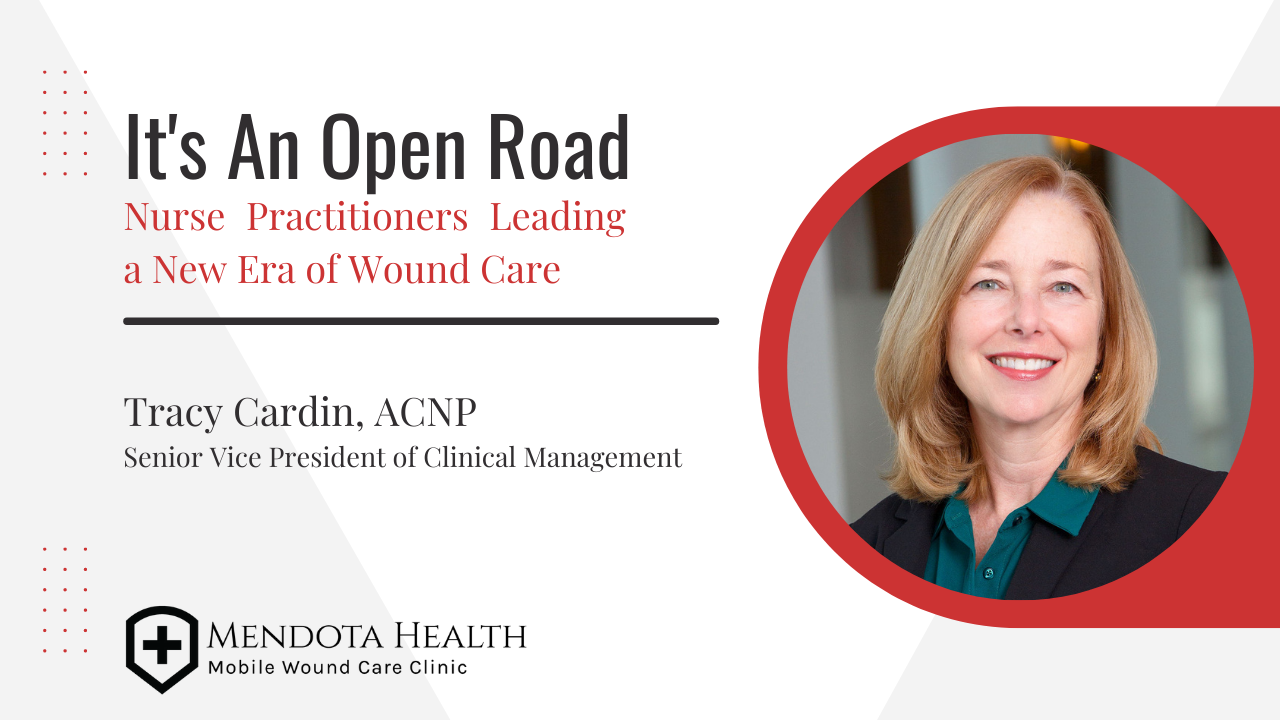
14 Nov It’s An Open Road – A New Era of Wound Care
Lee George:
Thank you so much for spending some time talking about joining Mendota Health and your vision for the practice. Tell me about why you joined Mendota Health?
Tracy Cardin:
I love the clinical model. I love that we’re making a real difference in people’s lives. And it’s the vision of the unobstructed care delivery model using nurse practitioners for wound care at home. In the home is where all the healthcare innovation is really occurring. I really love that it’s a nurse practitioner driven model.
I came from a background where I spent a lot of time trying to negotiate and navigate between relationships between physicians and nurse practitioners. And when given the space, it’s so gratifying to see the impact nurse practitioners can have on the lives of patients. It really is my life’s work to demonstrate the impact nurse practitioners can have on healthcare overall, on the cost of care, on the quality of care. And to demonstrate that impact is what drives me.
In the home is where all the healthcare innovation is really occurring. I really love that it's a nurse practitioner driven model.
Tracy Cardin
Lee:
Why is demonstrating the impact of nurse practitioners your life’s work?
Tracy:
You know it’s stubbornness for one thing. I guess because I’ve seen the impact nurse practitioners have on individual patients. There’s a lot of territoriality in medicine; there’s a lot of hierarchy. And neither of these things serve patients well. If we demonstrate tangible benefits to care delivery where nurse practitioners are driving care, then patients and the healthcare system will see and feel that value.
What often happens, especially in the acute care space, or in many healthcare spaces, is the clinical work of a nurse practitioner gets tucked under the wing of a physician. And so, their work doesn’t have visibility to others in that setting and even sometimes to the patient. I really believe that once demonstration is allowed to bloom, then the contributions become visible and valued. Nurse practitioners can’t be valued in the care model without that visibility.
Lee:
What is holding the healthcare system back from truly realizing the gifts and impact of nurse practitioners?
Tracy:
There’s so much variability in terms of what a nurse practitioner can do across this country, how they can practice. And why? These decisions are not based on facts, or concerns around clinical outcomes, or quality, it’s really around politics and territoriality.
If we had more consistent and demonstrable reflection of the outcomes of nurse practitioners across the United States, then insurances would begin to see the value. And if they see the value, they maybe would help drive some the removal of the variation in clinical practice. This was done during the COVID pandemic. There were a lot of waivers for what nurse practitioners could provide in terms of care. As far as I know it seems like everything was alright then, so why isn’t it alright now? There is incredible opportunity to provide preventative public care or other specialized care.
Lee:
How do you continue to make progress to show the value of nurse practitioners to the world?
Tracy:
Well, it’s all about impact. And it’s around the desire of how can I, as an individual, how can I expand the deployment of nurse practitioners to make a difference to patients and providers in the world. I can do this if I’m leading people, have a seat at the table, and advocate for them by demonstrating the value they bring. So that’s really it. When our nurse practitioners are treating patients, making a difference, and being excellent, that’s how I demonstrate their value to the world.
Lee:
This desire to show the value of nurse practitioners didn’t come from nowhere, what’s your origin story?
Tracy:
Well, I started off actually, as a criminal justice major and I was going to be an attorney. I have a fair number of attorneys in my family, and I really wanted to be a litigator because I’m really argumentative. But I have also had a fair amount of loss in my family from cancer and other clinical conditions. When I was in high school my beloved grandpa and my great aunt were both dying. I would go visit them and I saw the importance of the small things that would provide them good care and maintain their humanity. Like “oh look at her nails, they are so dirty”, and “she’s got food on her mouth”, and “she needs to be repositioned”. So that is partly what motivated me to get a job as a nurse’s aide in high school. Caring for others is a calling and an altruistic endeavor. I like that each patient has a narrative. Each patient has a story about how they came to be under your care. Really taking the time to listen to them, hearing them, and seeing them as an individual, and then in integrating the plan of care into who they are, is something really sacred. It’s an art really.
Lee:
What do you think about Mendota Health’s nurse practitioner led model?
Tracy:
I mean it’s the best! Our nurse practitioners are right there at the bedside making treatment decisions, implementing interventions, evaluating and assessing progress, communicating to other members of the care team, billing for these services appropriately, and healing wounds! They are doing all this in a space that has traditionally been neglected. I can’t tell you the talent we have. Every time I talk to one of our nurse practitioners I think “I need to clone you”, they are just wonderfully great at making a difference in patients’ lives.
Lee:
What would you tell your nurse practitioners about the work ahead?
Tracy:
We can build this. Whatever is needed, we are simply going to build it. It’s an open road and there is nothing stopping us from building the best in the world!
Lee:
Thank you Tracy for your time today and for the amazing work you and all of our nurse practitioners do each day for our patients.

